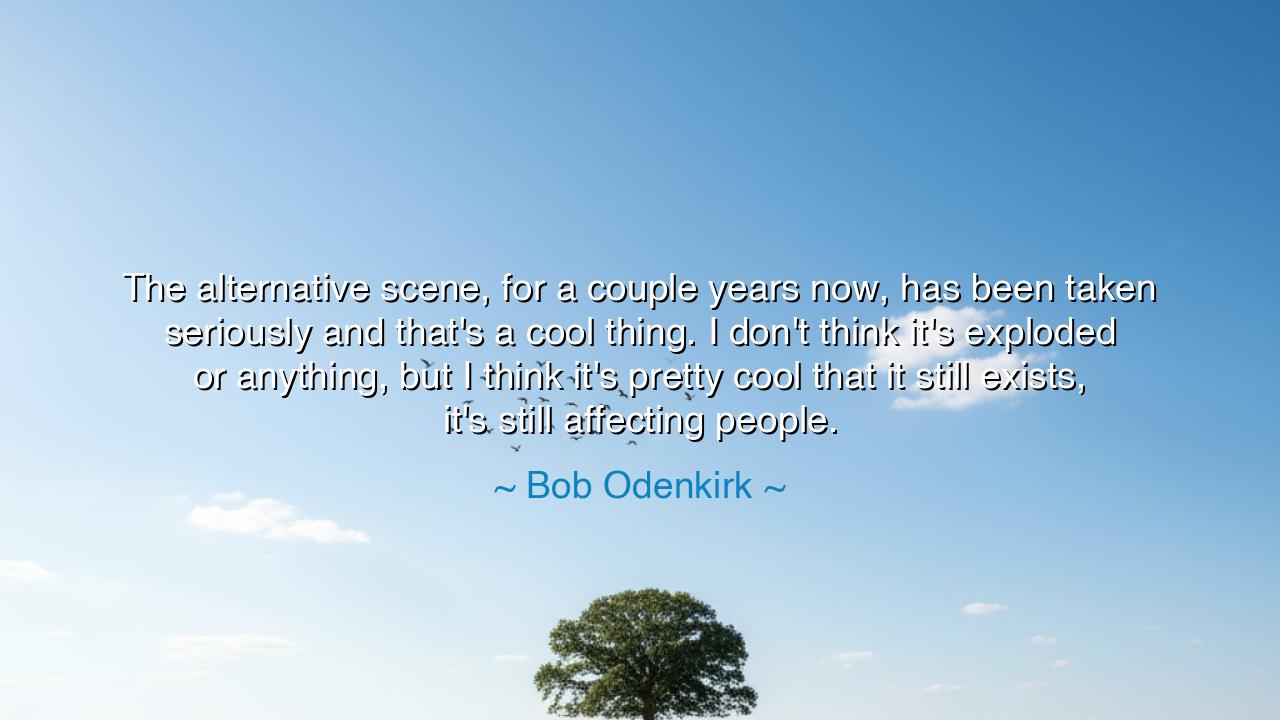
The alternative scene, for a couple years now, has been taken
The alternative scene, for a couple years now, has been taken seriously and that's a cool thing. I don't think it's exploded or anything, but I think it's pretty cool that it still exists, it's still affecting people.






In the annals of history, there have always been movements—quiet rebellions of the soul—that rise from the fringes of society, offering an alternative to the mainstream. These movements, whether in art, philosophy, or culture, often begin as whispers but grow over time, leaving a lasting imprint on the world. The words of Bob Odenkirk, “The alternative scene, for a couple years now, has been taken seriously and that’s a cool thing. I don’t think it’s exploded or anything, but I think it’s pretty cool that it still exists, it’s still affecting people,” speak to the resilience of such movements—those that refuse to be ignored, those that continue to affect the world, even without the loud acclaim or explosive success of the mainstream.
The alternative scene, whether in music, art, or philosophy, has always been the realm of the outsiders, the visionaries who do not fit into the established norms but instead seek to create something new, something that challenges the status quo. This scene is like the ancient philosophers who dared to question the world around them, or the artists who painted what they saw in their hearts, not what was demanded by society. In the same way, Odenkirk’s words capture the spirit of a movement that has remained authentic, grounded in its own vision, and undisturbed by the pressures of conventional success.
Consider the Renaissance, when artists and thinkers like Leonardo da Vinci and Michelangelo took the world by storm, but not in the way the world expected. They did not create simply for the approval of the powerful; they created for the sake of truth, for the sake of beauty. While their works were eventually celebrated, their innovations were once seen as alternative, unconventional. It was this very nonconformity that allowed them to break new ground, to change the very way humanity saw itself. The alternative scene Odenkirk refers to shares this lineage—it is not about explosive fame, but about quietly carving out a new path, one that may not be immediately accepted but will eventually be remembered for its impact on the world.
The ancient Greeks too had their own form of the alternative scene, particularly in the realm of philosophy. Socrates, though he did not have the fame of the aristocracy or the support of the ruling class, created a movement of thought that has shaped the very core of Western philosophy. His method of questioning, his challenge to the established order, was seen as a rebellious act in his time. He was not interested in exploding onto the scene or gaining popularity; rather, his commitment to truth and integrity eventually affected the world in ways far greater than he could have imagined. In the same way, the alternative scene that Odenkirk speaks of is not about the loudness of the moment, but about the slow, steady influence it has on culture over time.
Odenkirk's statement reminds us that the value of such movements is not necessarily in how loud they become or how quickly they rise, but in their ability to persist and continue to affect people. The beatniks of the 1950s, though they did not dominate the mainstream, created a legacy that shaped the counterculture of the 1960s and beyond. Their ideas—on individual freedom, self-expression, and anti-materialism—began as whispers but grew to become a fundamental part of modern society’s consciousness. The alternative scene today is doing the same, planting seeds of change in the hearts of those who hear its call.
The lesson here is clear: it is the quiet movements, the unconventional paths, that often change the world in the most profound ways. Just as the ancients saw the value in nonconformity and rebellion against the norm, so too must we recognize the power of the alternative. The world may not always recognize the importance of these movements in the moment, but their impact is inevitable. Whether in art, philosophy, or culture, it is often the unheard voices and the quiet rebels who ultimately leave a lasting mark on the world.
In your own life, take inspiration from the alternative scenes of history. Do not measure your worth by how loudly you are heard or how quickly you rise. Instead, focus on creating something meaningful—something that reflects your truth, even if it does not immediately receive the recognition you think it deserves. Like the philosophers, artists, and visionaries of the past, know that the quiet work of today can become the foundation for the future. Let your passion and integrity guide your actions, and in time, you too will affect the world in ways you may not fully see in your lifetime, just as the alternative movements that Odenkirk celebrates continue to shape culture.






AAdministratorAdministrator
Welcome, honored guests. Please leave a comment, we will respond soon